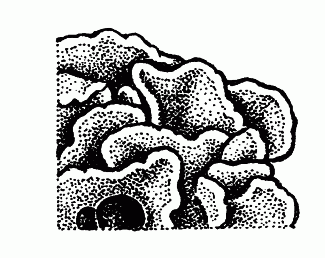Psora rubiformis (Ach.) Hook.
Moonlight pennies
Psoraceae
Introduction to the Lichens
Moonlight pennies
Psoraceae
Introduction to the Lichens
Map
Distribution of Psora rubiformis unavailable
Species Information
General:
Common Name: The Scale Lichens. Suggested by the tiny, rounded, often somewhat overlapping lobes of the species.
Small stratified squamulose lichens, corticate above, corticate or not below, nonsorediate, nonisidiate, squamules broadly attached to substrate or more often attached at one margin, closely appressed to loosely attached, short to more often subrotund, averaging to 2–5 (–8) mm wide, usually rather thick. Upper surface pinkish or more often brownish, somewhat shiny or not, often white-pruinose. Lower surface pale or darkening, lacking rhizines. Medulla white. Photobiont green.
Apothecia located over upper surface or along squamule margins, disc usually convex or hemispherical when mature, reddish brown to black; spores simple, ellipsoid, colourless, 8 per ascus.
Over exposed, base-rich soil or rock.
Notes: Psora is primarily a genus of semi-arid or arid areas, especially at temperate latitudes. Of the 17 species reported for North America, seven are found in B.C. This is a taxonomically difficult genus in which the species are not always clearly circumscribed.
Species description:
Over soil, moss or occasionally base-rich rock; lower surface pale, sometimes cottony; fruiting bodies (apothecia) not immersed, usually hemispherical at maturityAND
Apothecia reddish brown, brown or black, situated primarily over upper surface of lobes (check young apothecia); lobes appressed or ascending; upper surface never bright red AND
Lobes distinctly ascending, often partly vertical; upper surface in part greenish (check sheltered lobes); apothecia often compound, black or brownish black AND
Lobes to 4 mm long; upper surface yellowish green (check sheltered lobes); lower surface yellowish; restricted to northern alpine areas
Comments:
Earlier reports of P. rubiformis from B.C. appear to belong to the more widespread P. nipponica. The only authentic specimens known to us were recently collected in the Tatshenshini Valley.
Reactions:
Cortex KC+ yellow (or apparently KC-); medulla KC+ reddish or KC-.
Contents:
Usnic acid (and gyrophoric acid).
Source: Lichens of British Columbia
Illustration

If more than one illustration is available for a species (e.g., separate illustrations were provided for two subspecies) then links to the separate images will be provided below. Note that individual subspecies or varietal illustrations are not always available.
Illustration By: Trevor Goward
Habitat and Range
Habitat: Rare over base-rich soil (especially thin soil over rock) at alpine elevations in northern intermontane localitiesWorld Distribution: western N Am – eastern N Am – western Eurasia, N to AK, S to CO.
Source: Lichens of British Columbia
Status Information
Synonyms
Synonyms and Alternate Names:
Lecidea rubiformis (Ach.) Wahlenb.
